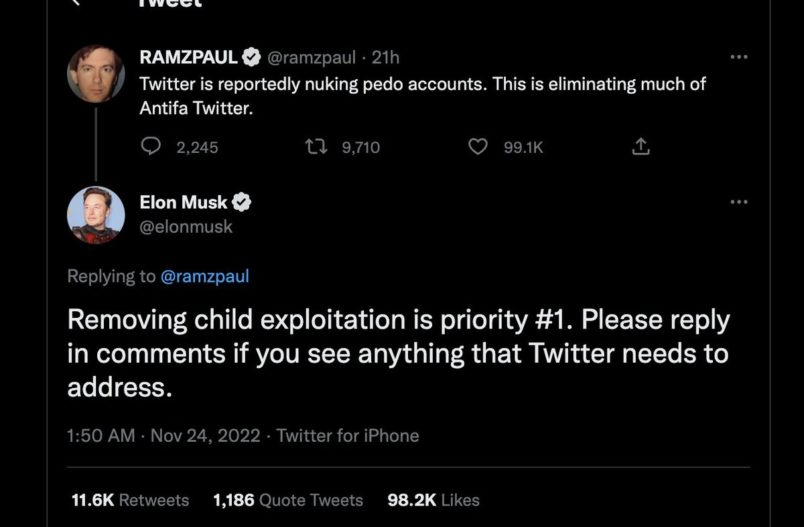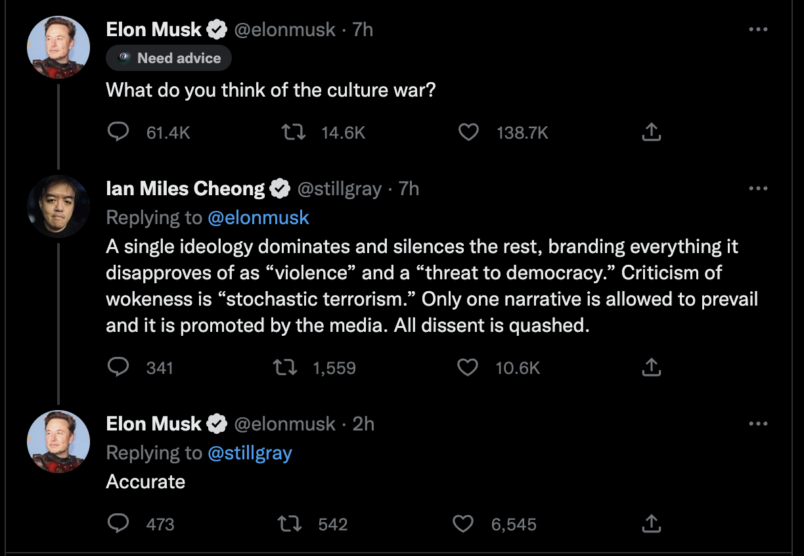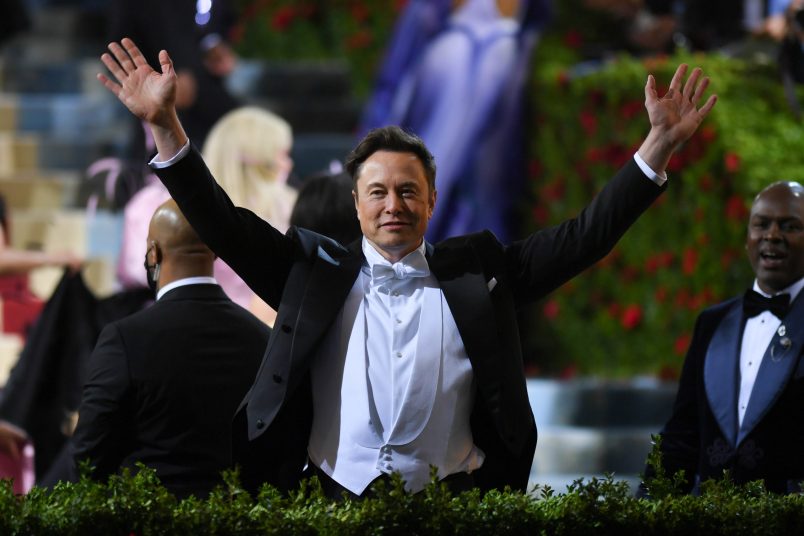It’s a fascinating thing to watch far-right radicalization unfold in real time. I’ve been watching the Elon Musk and Twitter drama with a mix of fascination and awe. He bought Twitter as part of his romance with the “free speech”/anti-“cancel culture” right and Donald Trump. Just what set him off on that path has never been adequately or convincingly explained, though there are a number of very plausible and not-mutually exclusive theories. Over the last four weeks Musk’s attachment to this crowd and that ideology have been constantly apparent. He gave an early and even for him startling taste of this when he tweeted out a rank gay-bashing conspiracy theory about the QAnon dead-ender’s hammer attack on Paul Pelosi days before the November 8th election. The process has only accelerated and intensified over the subsequent four weeks.
As he virtually high-fives supporters on Twitter he’s moved on from “free speech” and ending bans on people like Donald Trump to a much more explicit insistence that old Twitter management ran the site with the express purpose of elevating the left over the right. So just two days ago, for instance, he wrote: “Far left San Francisco/Berkeley views have been propagated to the world via Twitter. I’m sure this comes as no surprise to anyone watching closely. Twitter is moving rapidly to establish an even playing field. No more thumb on the scale!”
Then a few hours later he followed up with this: “It is objectively the case that ‘conservative’ political candidates were more negatively affected than ‘progressive’ candidates. Anyone using Twitter knows this. Question is simply one of magnitude.”
This came in response to a comment from a Bitcoin enthusiast who wrote: “I heard from a primary source that political groups would regularly contact twitter to deboost their candidates’ detractors and twitter would happily do that. That seems to put the finger on the scale of democracy.”
Comments like these have become commonplace from Musk. But in recent days he’s increasingly been promoting far-right theories and white supremacist content that may be rife on Twitter but are not immediately tied to his claims about Twitter’s old management or anti-“cancel culture” activism.
Recent conversations he’s engaged in have either been applauding him or encouraging him to crack down on “grooming” or pedophile or child exploitation accounts. Certainly management at any social network should be monitoring and rooting out such accounts. But it’s highly improbable that Musk’s team is more focused on combatting pedophiles and child exploitation than old Twitter management was. Indeed, Musk’s Twitter would likely be hard pressed to crack down on anything at the moment since Musk has already fired most of the workforce that handled content moderation, hate speech and abuse of all kinds.
But you don’t have to look hard at these exchanges to see that pedophilia and child exploitation are not precisely what’s being discussed. They’re calls to crack down on gay, trans and other accounts which the far right have rebranded as “groomers” and “pedophiles.” Increasingly, it’s even more scattershot and general. It’s a call to crack down on liberal or left-wing accounts or anything connected to the “woke mob,” since all those groups are by definition “groomers” and pedophiles. There’s far too little recognition of how much all of this amounts to little more than a mainstreaming or buttoning up of the PizzaGate and QAnon eliminationist conspiracy theories about Democratic politicians like Hillary Clinton running pedophile sex rings.
In recent days he’s begun promoting explicitly white nationalist content too. Indeed, the two often meld together. Here he is, for instance, on Thursday.

This tableau requires some translation. “Ramzpaul” is Paul Ray Ramsey, a notorious white nationalist. Here Ramsey casually equates left-wingers with pedophiles and Elon replies validating the slur and saying Twitter is on the case.
Reducing pedophilia from a scourge to a cudgel isn’t new for Musk. In 2018 he lashed out at British cave explorer Vern Unsworth during the effort to rescue boys trapped in a flooded cave in Thailand after Unsworth turned down Musk’s offer to build a special submarine to facilitate the rescue. “Sorry pedo guy,” Musk tweeted, “you really did ask for it.” At his subsequent defamation trial, Musk explained that he meant the comment not as a factual statement but as an insult. The cave explorer’s rejection was “wrong and insulting, so I insulted him back,” Musk testified.
A day before Musk’s exchange with Ramsey there was this.

Again, some decoding and context is necessary. “Kim Dotcom” is a German national and notorious internet fraudster who has been holed up in New Zealand for years fighting extradition to the U.S. to face charges of racketeering, fraud and money laundering. Here he makes a straightforward statement of so-called “Great Replacement Theory” and Musk responds with a straight up, “Just so.”
Just as I was writing this post, there was this.

And there was this interaction with Ian Miles Cheong also this morning. Cheong is another far-right influencer who has been banned from numerous platforms for a mix of fraud, harassment, impersonation and simply being a far-right weirdo.

Let’s start with the simple observation that it’s not ideal to have the owner of one of the world’s largest and most influential communication platforms operating in a social and political milieu of white nationalists and international outlaws. What captures my attention, though, is the process, the trajectory. It’s what we might call a narcissism/radicalization maelstrom and it mirrors what you could observe with Donald Trump in 2015 and 2016.
It’s clear that Donald Trump had dark political impulses and beliefs going back decades. He put his cards on the table clearly enough when he announced his presidential campaign with denunciations of Mexican immigrants as rapists and murderers. But his politics weren’t as fleshed out ideologically or as clearly articulated as they would soon become. You could watch in his online interactions how his ego followed the praise and fawning. His narcissism pulled him toward the people who became his most loyal online devotees and they were routinely and unsurprisingly the most ardent white nationalists and far-right agitators. They showed up increasingly in his Twitter timeline. He started engaging with them and promoting them. The point isn’t that Trump was some kind of naif pulled into a radicalization spiral. He had all the building blocks. I doubt very much that in mid-2015 Trump had any real familiarity with the arcana of racist and radical right groups, their keywords or ideological touch-points. But they knew he was one of them, perhaps even more than he did. They pledged their undying devotion and his narcissism did the rest.
Elon Musk is on the same path. There are various theories purporting to explain Musk’s hard right turn: a childhood in apartheid South Africa, his connection with Peter Thiel, disappointments in his personal life. Whatever the truth of the matter, whatever right-leaning tendencies he may have had before a couple years ago appear to have been latent or unformed. Now the transformation is almost complete. He’s done with general “free speech” grievance and springing for alternative viewpoints. He’s routinely pushing all the far right storylines from woke groomers to Great Replacement.
One particularly notable hint about the future came in a fractious interaction on Wednesday when Musk rolled out his own antic Dolchstoßlegende manqué. In an exchange about advertiser departures and alleged media bias, Musk claimed that he had cut a deal with civil rights groups to create a “moderation council” but that they had broken the deal.

Perhaps needless to say, this did not happen. The reference is to a chaotic meeting Musk held with a group of leaders of prominent civil rights groups, including the NAACP and the ADL, on November 2nd. Musk had actually announced the “moderation council” days earlier. So even on its own terms the timeline doesn’t match up. We’re hardly four weeks into the Elon era on Twitter and he’s already cueing up a storyline in which he tried to placate the Blacks and the Jews and the gays but they betrayed him and set out to “kill Twitter.”
Not pretty.
Most of us know what it’s like to be caught up in the moment. In a moment of tense confrontation or ego injury it is natural, if unlovely, to pull tight to those who are there to defend you. Some of this is simply human nature. But with the likes of Musk and Trump it operates on a qualitatively different and more explosive level, the consequence of an innate narcissism, an ingrained sense of grievance and entitlement and the unique dynamics of social media. Their power and wealth also make their meltdowns vastly more consequential than yours or mine.


 Members-Only Article
Members-Only Article
